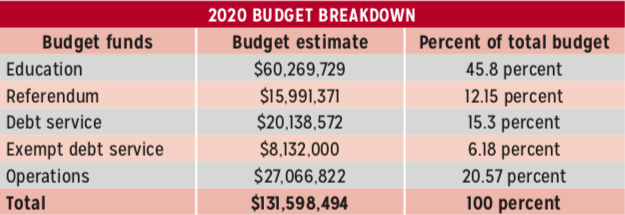The Noblesville Schools Board of Trustees has approved the district budget for 2020.
At its Oct. 29 meeting, the board unanimously voted in favor of the projected $131.6 million spending plan.
The budget is a few million dollars lower than the 2019 budget of $133.5 million. It still has to go through a review with the Indiana Dept. of Local Government Finance before a specific figure is set.
“It’s important to note that these aren’t apples-to-apples comparisons because the 2020 budget will likely see reductions,” said Marnie Cooke, communications director for Noblesville Schools.
Since the passing of the $50 million operating referendum in November 2018, the district is going into its second year using those funds.
“Referendum dollars supplement the other funds to cover needed education and operation expenses,” Cooke said. “We’re spending referendum dollars on compensation, safety and mental health.”
As of the administration’s most recent update, Noblesville Schools has spent approximately $1.57 million on enhanced and continued safety and security and $1.75 million on mental health initiatives with referendum dollars.
Another major feature of the 2020 budget is a significant pay raise for teachers. Approximately $2.93 million in referendum dollars has been spent since November 2018 to fund salary increases.
“Our new teacher contract brings the largest pay increase for Noblesville teachers in approximately 40 years with an average 9.75 percent increase the first year and an additional 4.15 percent average increase the second year,” Cooke said. “Due to state law, we weren’t able to bargain with our teachers until this fall. We are currently evaluating support staff salaries and are also committed to addressing any competitive pay gaps for these important employees.”
In addition, the district is required to pay down more of its debt service in 2020 than it did in 2019. Approximately 21.48 percent of the total projected 2020 budget will be used for debt service payments.
“A key challenge in general for building school budgets is knowing what funding the state legislature will provide and what our student count is, as they both fluctuate,” Cooke said. “The state funding is set every two years, so we knew what we would receive this year, but next year it will again be uncertain. Over the last 10 years, we’ve lost $49.4 million in state funding and property revenue, which is why Indiana schools must rely on referendum dollars.”



